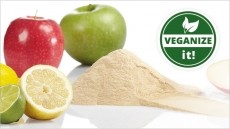Hairy vetch makes tomatoes tastier, say scientists
same flavour and nutrition-boosting genes and metabolic pathways as
in transgenic tomatoes, report ARS scientists.
Hairy vetch (Vicia villosa Roth) is a hardy legume native to Europe and Asia that is often used for soil improvement purposes. In this new study conducted by Italian and American scientists it was used as a mulch or protective cover over tomato plants. The findings, which are expected to be published in a future issue of The Journal of Experimental Botany, could prove beneficial in providing a flavoursome fruits that also cater to consumer demand for natural products and, conversely, mistrust of genetically-modified foods. The researchers from the US Department of Agriculture's Agricultural Research Service (ARS), in a collaboration with Purdue University and the Italian National Research Agency, grew both transgenic and non-transgenic tomatoes lines beside each other, covered in both black plastic and hairy vetch mulch. The transgenic tomatoes had the ySAMdc gene inserted, which makes plants "more vigorous", and their fruit "more tasty and nutritious". According to the ARS, it does this by creating higher levels of organic nitrogen compounds called polyamines. The suggestion with these plants is that the polyamines act as signalling molecules, which steer the metabolic pathways towards producing more phytronutrients. However the tomatoes grown in the hairy vetch mulch without the inserted gene were seen to react in a very similar way. The researchers report finding a build-up of amoni acids and choline - as well as other nutrients and antioxidants. However they were not able to ascribe the affect of the hairy vetch grown tomatoes to specific compounds or pathways. "The study's results testify to the power of organic legume cover crops or mulches like hairy vetch," said the ARS in its report of the findings. The organisation added that, when the transgenic potatoes were planted in hairy vetch, a "synergy" occurred that caused the fruit to have even higher levels of phytonutrients than either the non-vetch grown transgenic lines or the vetch-grown non-transgenic lines. FoodNavigator.com has not seen the full methodology or results of the study.




















